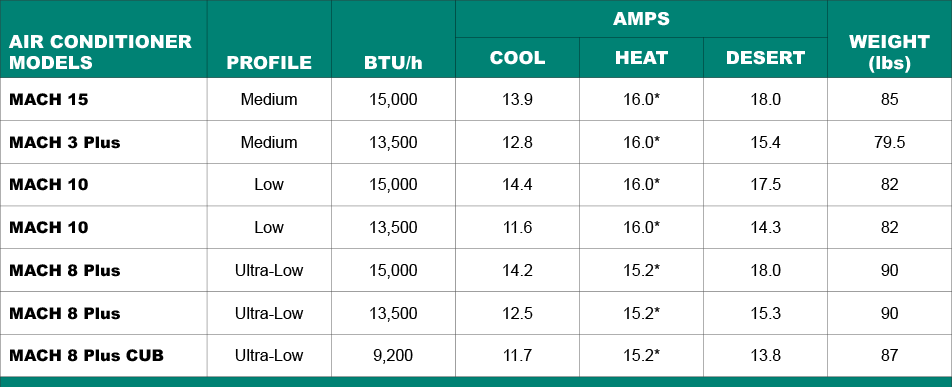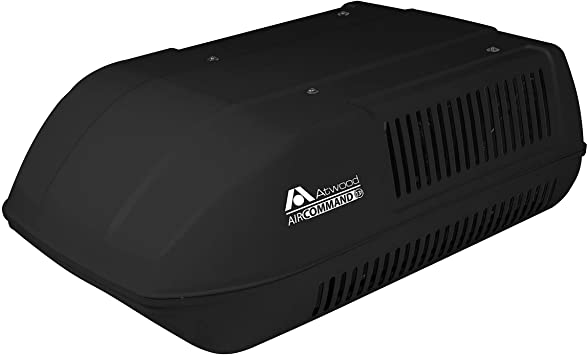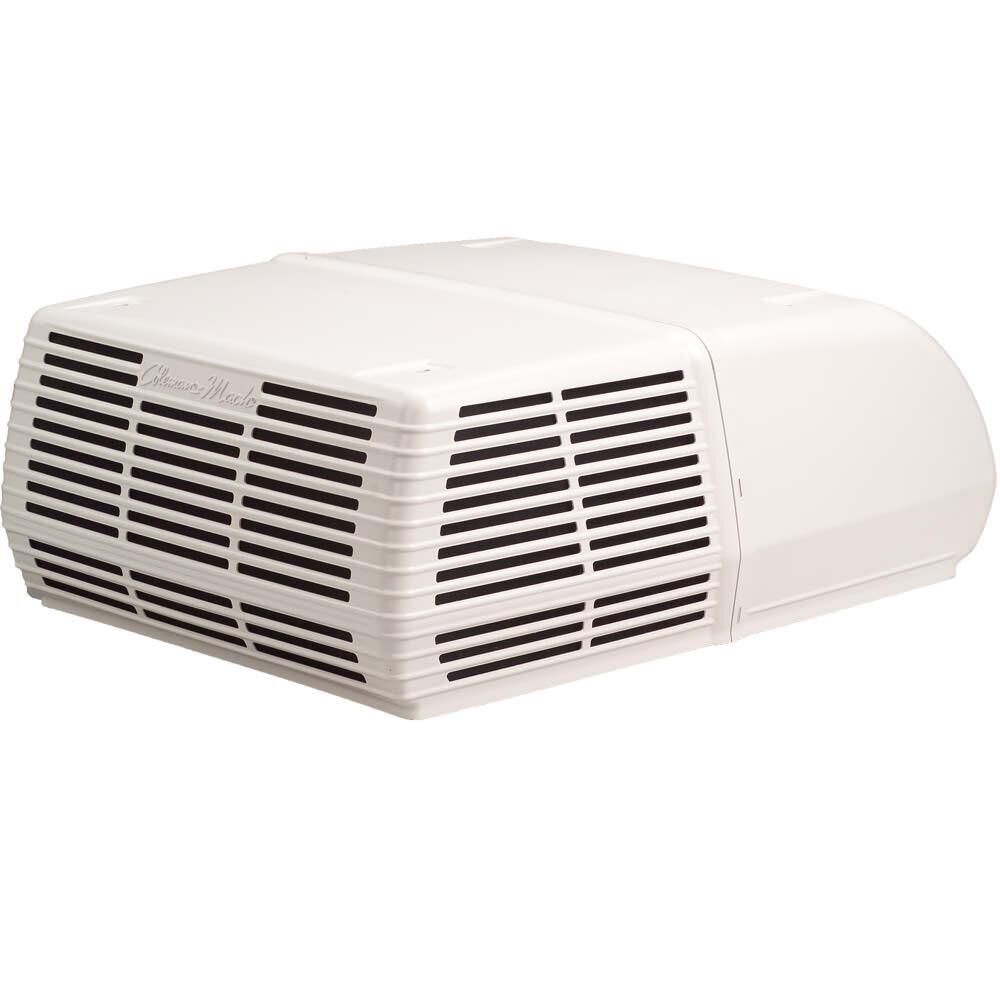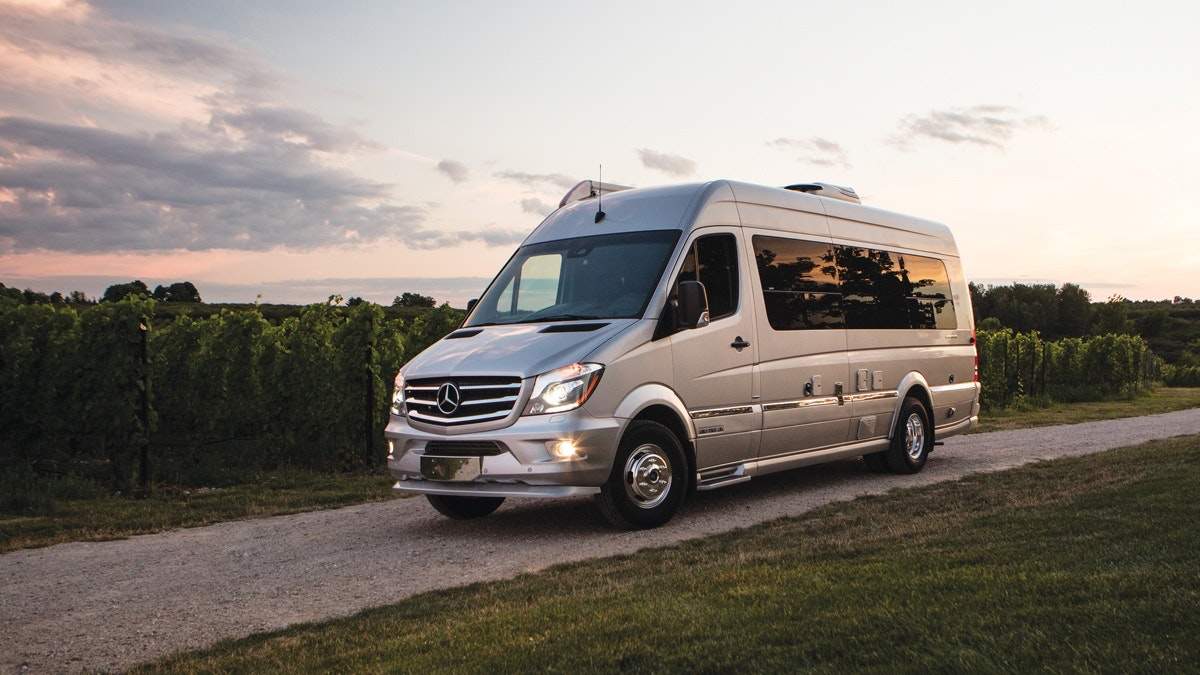When people purchase an RV, they might not worry about what kind of RV AC comes standard with their rig. What most people want to know is if the RV comes with an air conditioner, and if it does, what’s the best way to operate the unit.
Since all RVs, motorhomes, and travel trailers equipped with an air conditioner operate differently, it’s always best to consult your owner’s manual on how to operate or troubleshoot your system without voiding a warranty or causing damage to your AC. Most newer RV manufacturers place their manuals online, making it easy for owners to find the most common RV AC questions.
RVs For Rent Near You

Are you a curious RVer who wants to know what type of air conditioner comes standard with your rig? Are you in the market for a new RV AC? Regardless of your situation, you are probably reading this article to find out more about RV air conditioner units. Hopefully, we can provide you with a simple way to understand some of the RV AC basics so that you can better understand how RV air conditioner units work.
How to choose an RV air conditioner
RVers don’t always have a choice when it comes to picking a fifth-wheel air conditioner, travel-trailer air conditioner, or any type of RV air conditioner unit. Generally, manufacturers choose the style of the AC unit based on the layout and price point of the rig. Owners who want something different than what comes standard have to talk with the dealership or an RV service department to determine how to replace, remove, or upgrade an RV AC.
If you have the option to choose an RV AC, here are a few things to consider before starting your search for the perfect air conditioner unit. Keep in mind that RV AC units have limitations. The general RV AC rule of thumb is that most RV air conditioners are only capable of cooling the inside of an RV no more than twenty degrees from the outside temperature.
- Do you need a ducted or ductless system?
- Would the size of the unit impact your rig’s aerodynamics?
- Would the size of the AC unit fit allow your rig to still fit inside your garage or storage space?
- Do you have the space for an AC unit on your rig?
- What RV electricity source will operate your AC?
- What’s the baseline amount of energy (British thermal units — BTUs) needed to operate your RV AC efficiently?
- Do you want a dual-purpose unit with a heat pump?
Types of RV Air Conditioners
Once you’ve determined what parameters you might need to work around, the next step is to decide what type of unit will work best for your rig. The main types of RV AC units installed on most rigs are either ducted and ductless, but don’t forget about modern technology — the portable AC unit is a small RV air conditioner creeping into the RV scene as a viable option for some rigs.
Ducted
Ducted air conditioning systems allow a rig to operate with more than one air conditioning unit and move air through the ceiling, walls, and floor, controlling the temperature in more than one RV room. Ducted RV AC units usually sit on the roof of an RV.
Ductless
Ductless units sit somewhere, usually the top of an RV, under a bench, or inside a window or wall opening. Ductless units force the air from the AC through vents or multiple vents. Vents are usually directional and easy to open or close, and they force air into smaller areas of an RV. Ductless units have a compressor, condenser, and blower housed inside an aerodynamic casing, and in some cases, ductless units also operate as heat pumps. Types of ductless units include the rooftop, window, and under-bench air conditioning system.
The Best Brands in RV Air Conditioners
RV air conditioners vary in price, and each brand has differing price points. Price varies depending on your space and intended usage. What might be a perfect travel trailer air conditioner might not be the best choice for a Class A motorhome or a truck camper.
Some of the best brands on the market today include:
Dometic RV air conditioner

Dometic boasts easy installation and AC maintenance, as well as better cooling and improved airflow. Choose from ductless and ducted designs.
Airxcel RV air conditioner

Airxcel has a vast selection of air conditioners and heat pumps. Whether you need medium, low, or ultra low profile air conditioner for your RV, they have it.
Advent RV air conditioner

This ductless RV air conditioner is lightweight, easy to install, and affordable. The brand boasts a quality design built to withstand the challenges associated with the RV environment.
Atwood RV air conditioner

Atwood’s Air Command ducted AC roof units have been found to be quieter than competitors units. They also have precise temperature control, digital temperature readout, and a wireless remote to adjust the AC from anywhere in the RV.
Coleman RV air conditioner

The Coleman AC unit is the “world’s most powerful RV air conditioner with the highest cooling output you can buy.” It has been engineered to have an easier start under hot and humid conditions.
RV Air Conditioner Energy Efficiency Tips
To enhance the energy efficiency of your RV air conditioner, consider these tips:
- Use Reflective Window Covers: Installing reflective or insulating window covers can significantly reduce the heat entering your RV, making it easier for your AC to maintain a comfortable temperature without using excessive power.
- Park in the Shade: If possible, choose shaded areas or use awnings to block the sun’s rays from directly heating your RV, lowering the workload of your AC.
- Maintain Airflow: Make sure air vents and ducts inside your RV are not blocked. Clean filters regularly and ensure that vents remain open to allow for better air circulation.
- Upgrade to a More Efficient AC Unit: Older air conditioning units tend to be less energy-efficient. Consider replacing your unit with an ENERGY STAR-rated model that offers better performance with lower power consumption.
- Use a Programmable Thermostat: Install a programmable thermostat to help regulate the temperature without wasting energy. Set it to higher temperatures when you’re away, and lower it just before you return.
- Close Off Unused Areas: If you’re only using part of your RV, close off rooms or sections to focus the cooling power where it’s needed most.
- Use Fans in Conjunction: Ceiling fans or oscillating fans help distribute the cool air from your AC, allowing you to set your thermostat a few degrees higher without sacrificing comfort.
By combining these strategies, you can enjoy a cooler, more energy-efficient RV while minimizing your power consumption.
Maintenance and Troubleshooting Tips
Before attempting to work on an air conditioning unit, it’s best to review your warranty and RV maintenance plans. If your RV AC is under warranty, contact the warranty center to determine which steps you should take to get help with your air conditioning unit. Use your RV AC manual for instructions on how to operate, maintain, and troubleshoot your air conditioning unit. Also, remember when working with anything electric, take the proper precautions to prevent injury.
Periodic Maintenance
- Inspect the exterior of the AC for damage.
- Check for coolant leaks. If you have a leak, don’t operate your air conditioner and contact a Certified or Master Certified RV Technician.
- Remove debris that might have collected in the air-conditioner pan like sticks, twigs, or leaves.
- Check the condenser and evaporator coils. If either looks dirty, follow the instruction manual’s suggestions on cleaning.
- Check the drain hole for debris and remove anything that might block the hole.
- Check for loose wiring.
- Clean or replace the AC filters.
Troubleshooting Your RV Air Conditioner
Two common issues with RV air conditioners are:
- cooling
- power
If you encounter these problems, don’t worry. Here’s what to do before calling for mobile RV repair.
Cooling
- Remember the temperature differential of 20 degrees. An RV AC won’t cool an interior temperature more than 20 degrees cooler than the temperature outdoors.
- Check the thermostat’s settings and ensure nothing is blocking the temperature sensors.
- Use a digital thermometer to check the temperature of the air coming from the vents. If the air registers hot or is not cooling as expected, there might be a slow coolant leak or a faulty component. Note the temperature when the RV AC runs on high for about 15 minutes. Coolant and component repairs should be done by a professional, but it’s good practice to give the technician details such as temperature ratings.
Power Issues
–Check the breaker box for tripped breakers. If the breaker is in the off position, reset the switch to on.
–Check and replace blown fuses.
–Check your shore power source (connection and breakers). Use a multimeter to check the voltage coming into your RV.
No one can predict unexpected RV problems or unplanned repairs. However, maintaining your systems according to the manufacturer’s suggestions will help keep your systems running smoothly for longer.
If you need RV maintenance during your road trip, check out these guides:
Signs it’s Time to Replace Your RV AC
Not sure if you need to replace your RV AC? Here are some signs it might be time.
- Frequent Repairs: Constant breakdowns or needing to repair the same issues repeatedly may signal that the unit is no longer reliable. Parts become harder to find or too expensive to replace, making a full replacement a more cost-effective solution.
- Poor Cooling Performance: If your AC struggles to maintain a comfortable temperature or cannot cool your RV effectively, even after regular maintenance or cleaning, it may no longer be efficient.
- Strange Noises: Unusual sounds like grinding, rattling, or squealing indicate that internal parts, such as the fan or compressor, are failing and may be beyond repair.
- Higher Energy Consumption: As an air conditioner ages, it may consume more power to achieve the same cooling effect. If you notice a significant increase in your energy bills, this inefficiency could be a sign that the system is overworking.
- Age of the Unit: Most RV air conditioners last 10-15 years. After this time, even if the system is still functioning, it may be less energy-efficient and more prone to problems. Upgrading to a newer model can improve performance and reduce repair costs in the long run.
- Leaking Refrigerant: If your AC is losing refrigerant, this can affect its cooling capacity. While minor leaks can sometimes be fixed, recurring refrigerant issues may indicate a larger problem with the compressor or coil, making replacement necessary.
- Unpleasant Smells: Foul odors coming from your AC, especially those that don’t go away after cleaning or maintenance, could be a sign of mold, mildew, or electrical issues inside the unit. This can be a health hazard and may require replacement if cleaning doesn’t resolve the problem.
If your RV air conditioner is showing any of these signs, it may be time to start considering a replacement to avoid further inconvenience and ensure a comfortable environment on your travels.
RV Air Conditioner FAQ
Want to know more about your RV AC? Here are answers to some of the most common questions.
How long does an RV air conditioner last?
RV air conditioners can last 10-15 years, depending on maintenance and usage. Regular care can extend their lifespan.
Can I run the AC on a generator?
Yes, but ensure your generator provides enough wattage for the AC unit. Check the power requirements of your specific model and match it with your generator’s capacity.
Why is my AC not cooling effectively?
Possible causes include dirty filters, low refrigerant levels, or a malfunctioning compressor. Cleaning the filters and checking refrigerant levels is a good first step.
Is it normal for my RV AC to freeze?
Freezing can happen if airflow is restricted, such as with dirty filters or blocked vents. Ensure proper airflow and check for issues like low refrigerant levels.
Stay Cool This Summer
Taking your rig for a ride this summer season? You’ll definitely want that RV AC unit up and running properly — it’s a hot one out there!
Use this guide to find the best RV air conditioner for your rig. And once you do, list it on Outdoorsy! When you’re not using it, plenty of renters are yearning to cross an RV road trip off their summer bucket list.








